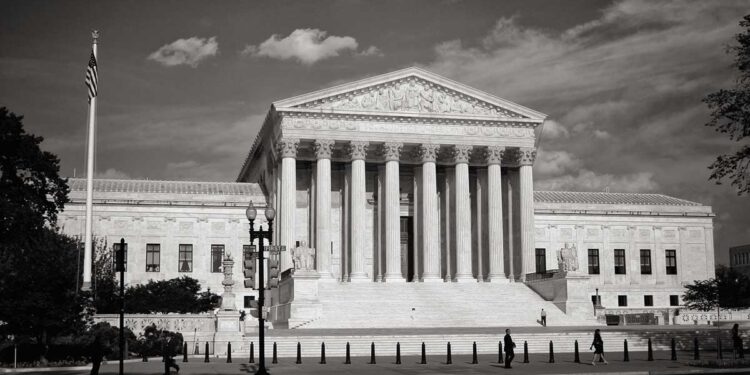“While public officials can act on behalf of the State, they are also private citizens with their own constitutional rights.” – Supreme Court Justice Amy Coney Barrett in Lindke v. Freed
The Supreme Court issued an opinion on March 15 supporting guidance that I and many other public information experts have long advocated: keep personal and public social media accounts separate. Now, this boundary is even more important.
In Lindke v. Freed, the Court held that the First Amendment prohibits a public official who uses their personal social media account for government purposes from blocking or deleting comments. This also means that the inverse is true: it’s ok for public officials to block or delete from their personal accounts when they act outside their official authority.
Lower courts were equivocal on this question, although courts have consistently ruled that public agencies and public officials cannot selectively block individuals or delete certain comments from official social media accounts. As with all forms of citizen-government interaction, restrictions on public social media accounts, if any, must be content-neutral.
While the Court’s opinion leaves many issues for other cases, it clarifies when personal social media functions as official government action. Factors include the timing of posts and whether bios or photos include official information.
The test established in Lindke is that an individual cannot block a person or delete their comments from their “personal” social media accounts if the answer to these two questions is yes:
-
Did the individual posting to social media have actual authority to speak on behalf of the government, and
-
Was the individual “purporting” to exercise that authority with the social media post(s.)
An important element in the Court’s reasoning is that almost all public officials are allowed private interactions with friends or others outside of their official capacity. Problems occur when officials mix these two distinct categories of communication. (I say “almost” all officials because certain very high-level positions, such as president of the United States, have narrow zones of privacy.)
Based on this ruling, here are some guidelines:
-
Publish official information on official agency social media accounts first. If others want to repost on personal accounts, they should link to the official source. I recommend that such reposts should not include personal commentary or information other than what is contained in the official information published elsewhere.
-
Individuals who post official information on their own accounts in their government capacity cannot delete comments or block detractors.
-
Do not use official photos or government titles on personal pages. Personal pages of public officials should clearly indicate “This is a personal page” or “For official business, visit [link.]” Profile pictures showing a person in a police uniform have never been appropriate for personal social media accounts. Now, using such photos could make the accounts official, based on the Lindke test.
-
Create separate official social media accounts for senior leadership positions that are distinct from personal accounts. Official accounts should be controlled by the agency and transferred to new officeholders when transitions occur.
For a good example of how to manage public social media accounts, check out the New York City Police Department’s accounts on X (formerly Twitter.) Every NYPD precinct has an official account with the precinct commander’s profile photo and name. When new commanders take over, the account profile is updated but stays with the precinct. Some commanders establish their own personalities on social media, but they are always speaking or writing in their official capacity. As such, they cannot block or delete comments or other posts. Nor do they get to take the official X account to their next position.
While the ruling helps define how the First Amendment and other laws apply to social media, it leaves room for future debate — and litigation. Writing for the court, Associate Justice Barrett suggests that deleting irrelevant comments might be permissible, such as comments about health code enforcement on an account of someone in a government department that has no role in that.
The ruling also creates a safer lane for government employees who are not official spokespersons or have no policy roles. For example, a police public information officer (PIO) could be considered to be acting in their government capacity anytime they speak about public matters. However, administrative workers or non-supervisory police officers probably can post personal comments about public matters without being considered to be acting on government authority, as long as they are not claiming or suggesting that they are speaking officially.
As with many court decisions, there’s plenty that remains murky. For example, if an official has a clearly personal social media account and chooses to repost a social media item from a city or other official account without adding comment, that may not make the personal account public. However, if a police chief or other official posts official information on their personal account, that account likely would be considered public even if that was not the intent. This would be especially true if official information is posted on the chief’s account before it shows up anywhere else.
I’m hoping most police departments already use their official accounts as the main source for information. This ruling should reinforce any efforts to persuade others that this is the best practice.
For further reading:
The full opinion is at 22–611 Lindke v. Freed (03/15/2024) (supremecourt.gov)
Other media coverage:
Supreme Court clarifies when public officials can block citizens on social media — Government Executive (govexec.com)
A Supreme Court social media ruling could set new free speech standards | AP News
SCOTUS Says Officials Who Block Social Media Critics Might Violate First Amendment (reason.com)
Supreme Court sets rules for officials who block social media critics — The Washington Post
For general guidance and best practices on social media for public agencies, read my book, The Communications Golden Hour: The Essential Guide to Public Information When Every Minute Counts (Public Safety Press, 2023.) The expanded 2023 edition has wisdom from some of the best social media managers across public agencies.









